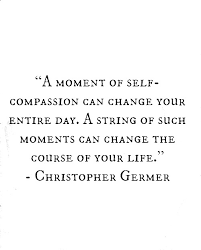'Consistently, research suggests that greater self-compassion is inversely associated with negative states of mind such as depression, anxiety and stress... Of course, a key feature of self-compassion is the lack of self-criticism, and self-criticism is known to be an important predictor of anxiety and depression Greater self-compassion is also linked with less rumination, perfectionism, and fear of failure.
The resilience self-compassion offers against negative states of mind may be related to the finding that self-compassion tends to decrease cortisol and increase heart-rate variability
Self-compassion appears to facilitate resilience by moderating people’s reactions to negative events.
self-compassion may decrease maladaptive emotional reactions because weaknesses feel less threatening when considered in the light of the shared human experience.
Self-compassion is associated with a number of positive psychological strengths. Self-compassionate people report feeling more happiness than those who lack self-compassion
They also display higher levels of optimism, gratitude and positive affect more generally.
Self-compassion has also been linked to emotional intelligence, wisdom, personal initiative, curiosity, intellectual flexibility, life satisfaction, and feelings of social connectedness – all important components of a meaningful life.
Self-compassion has been associated with feelings of autonomy, competence, relatedness, and self-determination.
Research suggests that self-compassion is not just a pre-existing personality trait – training in self-compassion can also result in enhanced psychological wellbeing. Three weeks of self-compassion training for college students led to significantly greater increases in optimism and self-efficacy, as well as significantly greater decreases in rumination in comparison to a time management control group.
Similarly, another study conducted an experiment in which individuals were asked to write a self-compassionate letter to themselves every day for seven days. They found that the brief intervention decreased depression for three months and increased happiness levels for six months compared to a control group who wrote about early memories. That is the beauty of self-compassion.
By wrapping one’s pain in the warm embrace of self-compassion, positive feelings are generated that help balance the negative ones, allowing for more joyous states of mind.




